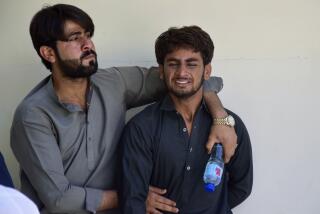Pakistan Warns Taliban Foes
- Share via
ISLAMABAD, Pakistan — Pakistani President Gen. Pervez Musharraf said today that Afghanistan’s opposition force should not try to take advantage of the U.S. and British military attacks against Osama bin Laden and his allies, the ruling Taliban.
Hours before the U.S.-led attacks, Pakistan braced itself for popular backlash by putting a pro-Taliban cleric under house arrest and reshuffling key military commanders.
Musharraf, trying to mollify a population that includes pockets of strong support for Afghanistan’s Taliban regime and its fundamentalist Islamic principles, said the military campaign needs to be short and targeted on Bin Laden’s Al Qaeda terrorist network, which the United States believes was behind the Sept. 11 terrorist attacks on New York City and the Pentagon.
“I certainly think the operation is not over,” he told a nationally televised news conference today in Islamabad, the capital. “It will carry on. I only hope it will be short.”
Musharraf stressed that the U.S.-British strikes were not on Afghan cities but on military facilities near the cities, saying the strikes were “against terrorists, terrorism, their sanctuaries and their supporters.”
He said he had told President Bush and British Prime Minister Tony Blair that “this action should not be allowed to be taken advantage of by the Northern Alliance,” referring to the Afghan opposition coalition fighting the Taliban.
Despite authorities’ efforts to keep protests under control, thousands of people were on the street of the main market in the border city of Quetta at midmorning today, angry about the U.S. airstrikes. Crowds burned a movie theater, and police used tear gas in an attempt to quell the mob.
On Sunday, authorities detained a virulently anti-American cleric, Maulana Fazlur Rehman, and placed him under house arrest in the frontier city of Peshawar. Rehman is leader of the Jamiat-ul-Ulema-e-Islam party, which has staged several pro-Taliban demonstrations in the past three weeks.
On Saturday, Musharraf, who took power in a 1999 military coup, reasserted his control over the army by extending his term as chief of staff for one year. Then, only an hour before the U.S. airstrikes were launched Sunday, he announced a reorganization of senior military commanders that stripped authority from one general known to have conservative religious views.
Gen. Mohammed Aziz Khan was moved from his powerful position as corps commander of Lahore, the capital of Punjab province, to a more ceremonial position as chairman of the joint chiefs of staff.
According to military experts, the appointment of another officer, Gen. Mohammed Yusuf, as vice chief of the army staff was designed to neutralize other conservative elements in the armed forces. The 600,000-strong Pakistani military is considered the most powerful institution in the country.
“These were all necessary and pragmatic moves,” said Lahore lawyer and author Aitezaz Ihsan. “In the wake of the attacks on Afghanistan, there is likely to be stoking of religious sentiments. It is not going to be easy for Pakistanis to live with the destruction of Afghanistan. Gen. Musharraf has neutralized this reactionary mind-set. After all, Pakistanis are not going to be watching the attacks like U.S. citizens. They are 12,000 miles away, and we are next door.”
Sharing a 1,500-mile border with Afghanistan, Pakistan finds itself in one of the most precarious positions in the region. Until recently, it was a key backer of the Taliban regime and one of only three nations to officially recognize it as the legitimate authority in Afghanistan.
Pakistan’s borderlands are predominantly populated by ethnic Pushtuns, who are also the largest ethnic group in Afghanistan. Since the 1950s, there have been periodic movements for Pushtun independence, and Pakistan considers a stable Pushtun population key to its national security.
After the Sept. 11 attacks on the U.S., Pakistan was one of the first states contacted by American officials seeking support. According to U.S. Ambassador Wendy Chamberlin, Musharraf agreed without hesitation to join the international coalition against terrorism.
That decision has had both political and economic costs. Because of heightened security concerns, Pakistan’s exports have dropped by more than 50%. Most international airlines canceled flights to Pakistan. Freight and insurance rates have soared.
In an attempt to repay Pakistan for the cost of its support, Washington has offered an array of economic concessions, including possibly forgiving the $3-billion debt that Pakistan owes the United States. This week, Pakistani Finance Minister Shaukat Aziz is scheduled to be in Washington to discuss economic aid proposals with Treasury Secretary Paul H. O’Neill.
To show political support for Pakistan, Chamberlin shared with authorities here evidence related to the Sept. 11 attacks gathered by U.S. and European investigators. And, in another gesture of gratitude and support, Blair traveled to Pakistan last week and met with Musharraf.
Pakistani authorities have been worried about possible assaults on Americans or citizens of U.S. allies in the event of military action against Afghanistan. More than 60 dependents of U.S. diplomats have been evacuated from Pakistan to other countries in recent weeks.
‘Pakistanis are not going to be watching the attacks like U.S. citizens.
They are 12,000 miles away, and we are next door.’
More to Read
Sign up for Essential California
The most important California stories and recommendations in your inbox every morning.
You may occasionally receive promotional content from the Los Angeles Times.










